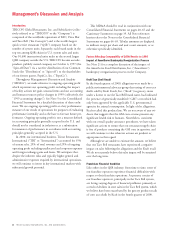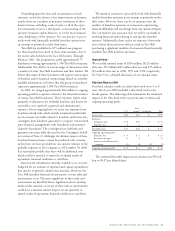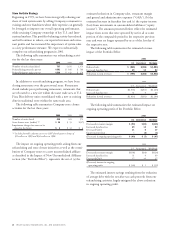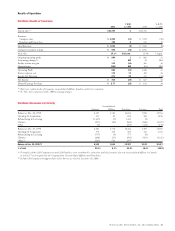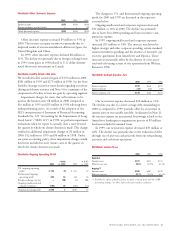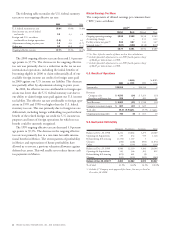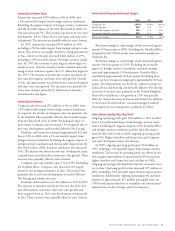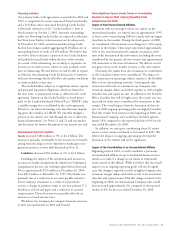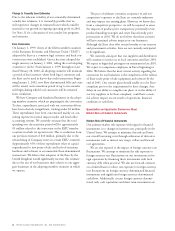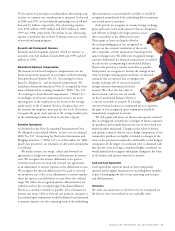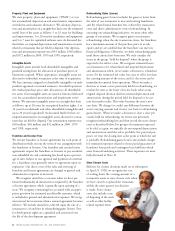Pizza Hut 2000 Annual Report Download - page 38
Download and view the complete annual report
Please find page 38 of the 2000 Pizza Hut annual report below. You can navigate through the pages in the report by either clicking on the pages listed below, or by using the keyword search tool below to find specific information within the annual report.36 TRICON GLOBAL RESTAURANTS, INC. AND SUBSIDIARIES
Consolidated Cash Flows
Net cash provided by operating activities decreased
$74 million to $491 million primarily due to unusual charges
associated with the AmeriServe bankruptcy reorganization
process. Changes in operating working capital reflected a net
use of cash of $207 million. The primary drivers of the net
use were receivables from the AmeriServe bankruptcy estate
and franchisee receivables arising from the Company’s program
to temporarily purchase food and supply inventories directly
from third party suppliers for the TRICON system and
sell a portion of these supplies to franchisees and licensees
(the “Temporary Direct Purchase Program”) related to the
AmeriServe bankruptcy reorganization process. These items
resulted in a net cash usage of approximately $135 million
of working capital. See Note 21 for a discussion of the
AmeriServe bankruptcy reorganization process.
Excluding the AmeriServe-related items noted above,
our operating working capital deficit reflects a decrease of
$63 million versus a decrease of $128 million in the prior
year. Our operating working capital deficit, which excludes
cash, short-term investments and short-term borrowings, is
typical of restaurant operations where the majority of sales
are for cash while payment to suppliers carry longer payment
terms, generally from 10-30 days. The lower working capital
deficit reduction in 2000 is the result of refranchising signif-
icantly fewer restaurants in 2000 versus 1999, as well as a
change in payment terms in our distribution agreement
from 30 to 15 days.
In 1999, net cash provided by operating activities decreased
$109 million to $565 million. The decline was primarily due
to a $128 million decrease in our working capital deficit. This
decrease was driven by our portfolio activities which resulted
in a significant reduction in accounts payable and other accrued
liabilities partially offset by higher accounts receivable.
Net cash used in investing activities was $237 million in
2000, compared to net cash provided by investing activities
of $522 million in 1999. The decline in cash flow from invest-
ing activities was primarily due to lower gross refranchising
proceeds as a result of selling fewer restaurants to franchisees
in 2000 versus 1999, increased capital spending related to
development and funding of AmeriServe during its bankruptcy
reorganization process.
In 1999, net cash provided by investing activities increased
$220 million to $522 million. The majority of the increase is
due to higher gross refranchising proceeds and proceeds from
the sale of international short-term investments in connec-
tion with a planned tax-efficient repatriation to the U.S.
Although we report gross proceeds in our Consolidated
Statements of Cash Flows, we also consider refranchising pro-
ceeds on an “after-tax” basis. We define after-tax proceeds as
gross refranchising proceeds less the settlement of working
capital liabilities (primarily accounts payable and property
taxes) related to the units refranchised and payment of taxes
on the gains. The after-tax proceeds can be used to pay down
debt or repurchase shares. After-tax proceeds were approxi-
mately $261 million in 2000 which reflects a 62% decrease
from 1999. This decrease was due to the refranchising of sig-
nificantly fewer restaurants in 2000. After-tax proceeds were
approximately $683 million in 1999, a 13% increase versus
1998. The increase was principally due to a greater number
of units refranchised as well as the mix of restaurants sold
and the level of taxable gains from each refranchising.
Net cash used in financing activities was $207 million
compared to $1.1 billion last year. Less cash was available
for financing activities in 2000 due to a net cash use from
investing activities as described above, and a use of cash to
fund increased share repurchases as more fully discussed in
Note 18. Accordingly, we repaid less debt in 2000 than 1999.
In 1999, net cash used in financing activities was essentially
unchanged versus 1998 at $1.1 billion. Payments on our
unsecured Term Loan Facility and our unsecured Revolving
Credit Facility totaled $1.0 billion.
In 1999, our Board of Directors authorized the repurchase
of up to $350 million of our outstanding Common Stock,
excluding applicable transaction fees. This Share Repurchase
Program was completed in 2000. During 2000, we repurchased
over 6.4 million shares for approximately $216 million. During
1999, we repurchased over 3.3 million shares for approxi-
mately $134 million. See Note 18.
On February 14, 2001, our Board of Directors authorized
a new Share Repurchase Program, as more fully described in
Note 18. The new Share Repurchase Program authorizes us
to repurchase, over the next two years, up to $300 million of
our outstanding Common Stock, excluding applicable trans-
action fees. We have not repurchased any shares under this
Program as of March 9, 2001.


